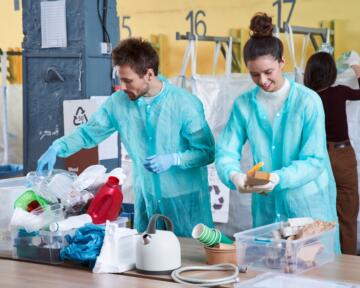On 15 April 2024, Trends Z brought together various experts for a round table discussion on the circular economy, to discuss the functioning and added value of circular entrepreneurship in detail. . In the 30 June 2025 broadcast, Trends Z focused on circular entrepreneurship in the construction sector. The aim was to examine the practical obstacles and opportunities associated with it.
How to scale up?
All panel members agree: the seeds of a circular economy have been sown. Now, the time has come to act with concrete measures. Unfortunately, several obstacles remain and are slowing down the process, including a lack of knowledge, experience and funding.
Axel Segers, CEO of EXIE, a manufacturer of bio-based building materials, is familiar with these obstacles: “We use agricultural raw materials such as hemp to produce insulation materials. Five years ago, the market wasn’t ready, but today demand is growing. I see collaboration, government support and access to the right financial incentives as the crucial levers.”
David Eloy, board member of construction firm Groupe Eloy, also sees potential: “The construction sector has a major impact, so we take our responsibility seriously. Properly sorting and processing construction waste such as concrete results in new, high-quality raw materials for use in newbuilds or renovations.”
Biocircular Construction Charter
Caroline Deiteren, director-general of trade association Embuild Vlaanderen, also sees a growing interest in circular construction: “Our members are eager to take steps, and we facilitate their initiatives. In March, we introduced the Biocircular Construction Charter. The ambition is to turn buildings into carbon dioxide storage units, for example by using locally produced biocircular materials wherever possible. Some 190 companies, including EXIE, have signed the charter, committing to cooperation and innovation.” Embuild’s goal is for biocircular materials to become standard in both newbuilds and renovations by 2050.
Environmentally sustainable, economically valuable
In Wallonia, GreenWin
plays a key role in facilitating knowledge sharing across the chemical, construction and environmental sectors. Chair David Lamy notes that over 200 companies have already joined: “We’re not only looking for sustainable solutions, but also for economic added value. It’s no coincidence that members are showing strong growth. There’s a clear link between sustainable innovation, circular business models and improved competitiveness.”
Entrepreneurs share their expertise
Other sectors are also laying the foundations for a circular future. Lieze Cloots, Head of Strategy and Policy at OVAM, is involved in the many learning networks being set up around this theme: “Topics such as circular procurement, alternative packaging, and sharing or leasing bring many entrepreneurs together to exchange insights. That chain-wide approach continues in the new call for proposals launched by OVAM and Circular Flanders. They’ve earmarked 2 million euros to support businesses proposing projects focused on cooperation and resource-sharing within the circular economy.”
Hélène Herman, Communications Officer at Circular Wallonia, helps companies conquer barriers on a daily basis. “Besides collaboration, knowledge-sharing and financial backing, digitalisation is another key lever. We see that this boosts efficiencyEfficiency is focused on the productivity of resources, i.e. in an improvement in the relationship between the natural resources used and the benefit they provide in the form of a product manufactured or a service provided., makes circular solutions more accessible to businesses and helps SMESmall and medium-sized enterprisess improve their market positions.”
Supporting Belgian businesses
Lien Meurisse and Etienne Mignolet, spokespersons for the FPS Economy, also highlight the potential of project grants and partnerships. “We support Belgian entrepreneurs by inspiring and informing them about the circular economy, both through our own website and that of our project Go for Circular. As part of Belgium’s Recovery and Resilience Plan, we launched calls for proposals in cooperation with the FPS Public Health. The call of the FPS Economy focused on substituting harmful chemical substances, while our federal colleagues focused on eco-design. In total, 32 companies were selected to develop projects. There are no open calls now, but we’ve seen strong demand for this type of support in practice. Our online self-test
on Go for Circular is also a handy tool that helps businesses gauge how far along they are in their circular journey. They can use it to identify the next steps and find the levers they need to conquer barriers.”
Watch the round table discussion on circular economy (in French or in Dutch).




